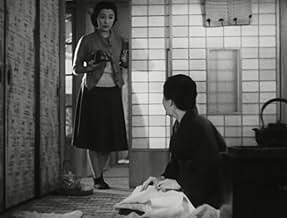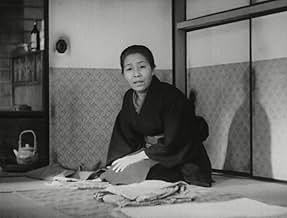AVALIAÇÃO DA IMDb
7,2/10
1,5 mil
SUA AVALIAÇÃO
Adicionar um enredo no seu idiomaWhen the patriarch of the Toda family suddenly dies, his widow discovers that he has left her with nothing but debt and married children who are unwilling to support her--except for her most... Ler tudoWhen the patriarch of the Toda family suddenly dies, his widow discovers that he has left her with nothing but debt and married children who are unwilling to support her--except for her most thoughtful son, just returned from China.When the patriarch of the Toda family suddenly dies, his widow discovers that he has left her with nothing but debt and married children who are unwilling to support her--except for her most thoughtful son, just returned from China.
- Prêmios
- 1 vitória no total
- Direção
- Roteiristas
- Elenco e equipe completos
- Produção, bilheteria e muito mais no IMDbPro
Avaliações em destaque
When a respected businessman dies unexpectedly, his affairs turn out to be in disorder, and his sons sell off most of his goods quickly. His widow, Ayako Katsuragi, and her youngest, unmarried daughter, Mieko Takamine, become houseguests of their siblings.... but they show little filial love. Will Shin Saburi, the wastrel son, inspired by his father's death to go off to China and work hard, turn out to be this Japanese version of KING LEAR's Cordelia?
Ozu hadn't completed a film in four years. When he came back to the studios to make this, his style had shifted and settled. Now, although he still hung his studies of familial relationships on sturdy plots, he had settled on what would become his postwar trademark of long, still shots from a low perspective. There's clearly a bit of wartime propaganda in the movie, telling Japanese civilians that there's endless opportunity in China to get ahead without worrying about getting into those awkward situations of losing face.
Ozu would make another movie the following year, then not another until 1947.... first problems with Japanese censors, and then clearing his name with the American Occupation forces. However, here we see the mature Ozu. He was excellent. He would only get better.
Ozu hadn't completed a film in four years. When he came back to the studios to make this, his style had shifted and settled. Now, although he still hung his studies of familial relationships on sturdy plots, he had settled on what would become his postwar trademark of long, still shots from a low perspective. There's clearly a bit of wartime propaganda in the movie, telling Japanese civilians that there's endless opportunity in China to get ahead without worrying about getting into those awkward situations of losing face.
Ozu would make another movie the following year, then not another until 1947.... first problems with Japanese censors, and then clearing his name with the American Occupation forces. However, here we see the mature Ozu. He was excellent. He would only get better.
Ozu enters William Wyler terrain with a somber upscale family drama about a mother and daughter who are shuttled in unwelcome fashion from one family member's home to another following the death of the family patriarch. The thematic elements of displacement within a family unit anticipate TOKYO STORY -- there's even a bedtime scene between the mother and daughter that echoes one in the later film. There's a startling lack of music in this film, esp. during Ozu's normally music-filled transitional shots, that contribute to an overall sense of tense unease that touches on what might have been the general wartime state of mind among Japanese at that time. The war makes a subtle appearance in the form of the youngest son who offers to take the unwanted family members with him to settle in China -- a moment which might be aligned with Imperialist propaganda, though in a fascinating way: the Chinese "frontier" seems presented as a place where Japanese society can escape its social hypocrisies and begin anew.
As usual, you can expect a lot of visual purity from the Ozu movie. This has immaculate framing and great compositions. Except that you can experience the same impeccable cinematic style in any of his other 50 movies, and a better story to boot. I tried to immerse myself in this lineage tale of misunderstandings and family breakdown, but I couldn't help but find it stilted.
I admittedly understand that it is a completely foreign culture to begin with, and a culture of Imperial Japan to boot. Be that as it may, the way the script portrays the supposed disrespect the eldest sister exhibits to the mother is the most spurious domestic argument imaginable, where it is simply impossible for me to gauge "the big deal," so to speak. Have Japanese families lived in perfect harmony before the turn of the century and the Meiji era? Have they never kept information from each other or had misunderstandings about how they should all act when the guests come over? Was there seriously no better way of demonstrating that they didn't want the pair there beyond this plastic irritability with a mother and younger sister melodramatically kneeling in front of the portrait of the late patriarch? Oh, those were better times, indeed. Or were they? Beyond the group photo scene, there wasn't even a good impression of how he ruled the family except for the debts that he left them.
Ultimately, of course, the emancipator son, who, without even knowing what happened, immediately assumes they were forced out and condemned to the villa. The cabin that they say is dilapidated and that they won't even sell seeing it is that bad. Which is an even more dishonest statement than the arguments. Looks cozy to me. Just the same, he rescues them and takes them to Tianjin. Good for them. They'll get in on the ground floor in China. 1941 is just about time.
I admittedly understand that it is a completely foreign culture to begin with, and a culture of Imperial Japan to boot. Be that as it may, the way the script portrays the supposed disrespect the eldest sister exhibits to the mother is the most spurious domestic argument imaginable, where it is simply impossible for me to gauge "the big deal," so to speak. Have Japanese families lived in perfect harmony before the turn of the century and the Meiji era? Have they never kept information from each other or had misunderstandings about how they should all act when the guests come over? Was there seriously no better way of demonstrating that they didn't want the pair there beyond this plastic irritability with a mother and younger sister melodramatically kneeling in front of the portrait of the late patriarch? Oh, those were better times, indeed. Or were they? Beyond the group photo scene, there wasn't even a good impression of how he ruled the family except for the debts that he left them.
Ultimately, of course, the emancipator son, who, without even knowing what happened, immediately assumes they were forced out and condemned to the villa. The cabin that they say is dilapidated and that they won't even sell seeing it is that bad. Which is an even more dishonest statement than the arguments. Looks cozy to me. Just the same, he rescues them and takes them to Tianjin. Good for them. They'll get in on the ground floor in China. 1941 is just about time.
Todake No Kyodai wonderfully captures Japanese social mores in its most regrettable form. If you wouldn't know better, you'd think that the people inhabiting the various interiors (almost all of the movie takes place indoors) are mere acquaintances. Strong socio-specific communicative regulations pervade every conversation, every movement, every wink of the eye.
I don't know much about Japanese society, but the fact that the family's mother is given the cold shoulder (after the pater familias had deceased) stroke me as a critique against individualized (westernized?) modern Japan.
I would also like to mention a nice, though unintended effect the movie had on me: the copy has aged gracefully and at times provides cool hallucinating screen compositions and distorted rainfall sounds, which are welcome diversions from the otherwise monotonous goings-on in the still home environments.
I don't know much about Japanese society, but the fact that the family's mother is given the cold shoulder (after the pater familias had deceased) stroke me as a critique against individualized (westernized?) modern Japan.
I would also like to mention a nice, though unintended effect the movie had on me: the copy has aged gracefully and at times provides cool hallucinating screen compositions and distorted rainfall sounds, which are welcome diversions from the otherwise monotonous goings-on in the still home environments.
Maybe it's not a film regarded as one of Ozu's best, but I found myself liking it.
This time Ozu delves into the problems that revolve around the death of a family member and what it causes. In this case the father of a big family dies and leaves them indebted, so the family makes the hard decision to sell many of his properties to pay his debts. The other matter shown in this film is the problem a family member faces (in this case the mother and one of her daughters) when they have to ask their relatives for hospitality but they don't have a good relationship between them and have a lot of differences, which causes the mother and the daughter to switch from one place to another and never finding a good place to stay in.
The film is really good on technical aspects, as usual in Ozu's films.
I would not recommend this film to people that are just beginning to explore Ozu's films, I would just recommend it to those who really are fond of them and are used to his filmmaking style.
My score: 8.5/10
This time Ozu delves into the problems that revolve around the death of a family member and what it causes. In this case the father of a big family dies and leaves them indebted, so the family makes the hard decision to sell many of his properties to pay his debts. The other matter shown in this film is the problem a family member faces (in this case the mother and one of her daughters) when they have to ask their relatives for hospitality but they don't have a good relationship between them and have a lot of differences, which causes the mother and the daughter to switch from one place to another and never finding a good place to stay in.
The film is really good on technical aspects, as usual in Ozu's films.
I would not recommend this film to people that are just beginning to explore Ozu's films, I would just recommend it to those who really are fond of them and are used to his filmmaking style.
My score: 8.5/10
Você sabia?
- CuriosidadesThere has been speculation that Ozu's direction of this film related to his own family's situation where his sister-in-law (married to his older brother) and mother did not get along.
- ConexõesReferenced in Bandoui bom (1941)
Principais escolhas
Faça login para avaliar e ver a lista de recomendações personalizadas
- How long is The Brothers and Sisters of the Toda Family?Fornecido pela Alexa
Detalhes
- Data de lançamento
- País de origem
- Idioma
- Também conhecido como
- Os Irmãos Da Família Toda
- Locações de filme
- Empresa de produção
- Consulte mais créditos da empresa na IMDbPro
- Tempo de duração
- 1 h 45 min(105 min)
- Cor
- Mixagem de som
- Proporção
- 1.37 : 1
Contribua para esta página
Sugerir uma alteração ou adicionar conteúdo ausente


















